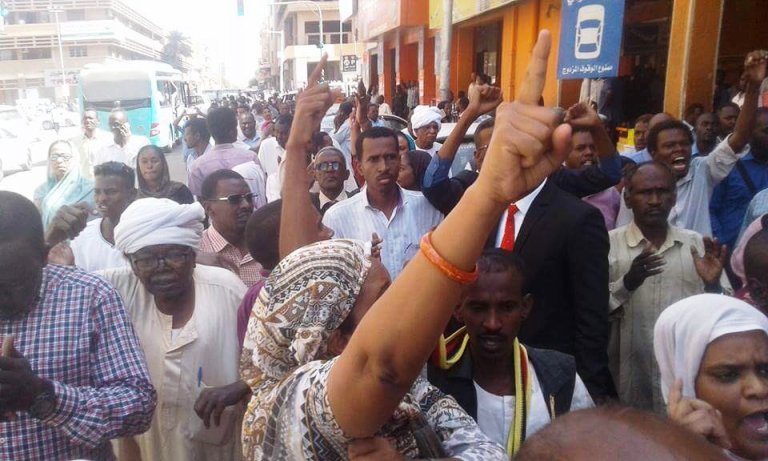Dozens arrested in Sudan as protests over price hikes continue

January 16, 2018 (KHARTOUM) – Dozens of demonstrators on Tuesday were beaten and arrested by police and security agents in Khartoum as hundreds of Sudanese took to streets in a peaceful march to protest against soaring commodity price.
Last week, the Sudanese Communist Party (SCP) asked Khartoum State authorities for permission to organize a peaceful march to the governor’s office to hand him over a memo against rising bread price but the request was denied.
However, the SCP joined by a number of opposition parties, activists and civil society organizations insisted on exercising their constitutional right to peaceful protest and called upon the masses to gather near the Presidential Palace in central Khartoum on Tuesday to march to the state’s headquarters.
In early Tuesday, the riot police and security agents cordoned the streets and prevented the protestors from reaching the gathering area.
Nonetheless, hundreds of demonstrators poured into the streets near the Presidential Palace and managed to penetrate the security cordon chanting “No, no to high prices, No to the government of hunger”.
The police and security reinforcements clashed with the protestors and dispersed them violently using tear gas and batons.
Dozens of the protestors were arrested including two members of the SCP Central Committee, Siddig Youssef, and Youssef Hussein besides rights defender Amal Habani and journalist Mamoun Eltilib.
Earlier this month, bakeries raised the price of a loaf of bread from 50 cents to 1 Sudanese pound following a government decision to increase the price of flour sack from 167 pounds to 450 pounds.
The government decision was part of tough economic measures contained in the 2018 budget which also saw the lifting of electricity subsidies as well as increasing the U.S. dollar exchange rate to 18.00 pounds from the official rate of 6.7 pounds.
The rise in bread price triggered sporadic protests in several Sudanese states leading to the killing of a high school student in West Darfur State.
To quell anti-austerity protests in Khartoum, Sudanese security forces in September 2013 carried out a brutal crackdown on the peaceful demonstration, killing nearly two hundred protesters say human rights groups or 86 people according to government figures.
Opposition forces attribute the deteriorating living condition and economic meltdown to corruption, lack of production policies, and lack of economic reform vision following the secession of South Sudan.
Sudan lost 75% of its oil reserves after the southern part of the country became an independent nation in July 2011, denying the north billions of dollars in revenues. Oil revenue constituted more than half of Sudan’s revenue and 90% of its exports.
(ST)
